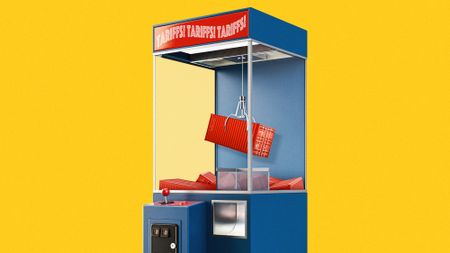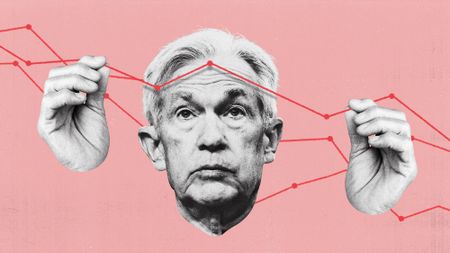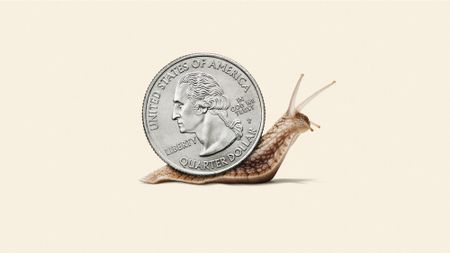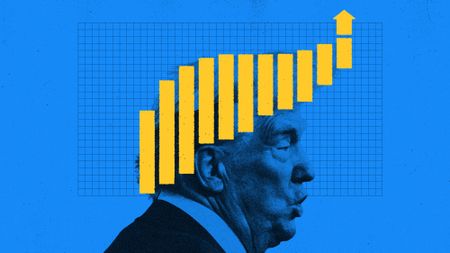Will Britain fall into a recession this summer?
Spiralling cost of living comes after the Russian invasion of Ukraine

Concerns are growing that Britain might slip into a recession amid slow post-lockdown growth and squeezed household incomes.
Economists have warned that the “double blow” of slowing growth and sky-rocketing living costs after the Russian invasion of Ukraine could see a fall in gross domestic product (GDP) for two consecutive quarters, “the definition of a recession”, reported The Guardian.
Thanks to “weaker than expected” growth in February, and inflation reaching its “highest levels since 1992” in April, forecasters have predicted that UK GDP is “on track” to grow by about 1% in the first quarter of 2022, “before slipping into reverse this summer”, said the paper. The economy is likely to shrink in the second quarter, before growing by just 0.2% in the third quarter, according to James Smith, an economist at the Dutch bank ING.
Subscribe to The Week
Escape your echo chamber. Get the facts behind the news, plus analysis from multiple perspectives.

Sign up for The Week's Free Newsletters
From our morning news briefing to a weekly Good News Newsletter, get the best of The Week delivered directly to your inbox.
From our morning news briefing to a weekly Good News Newsletter, get the best of The Week delivered directly to your inbox.
“It’ll be pretty close to a technical recession,” Smith told the paper. “Even if one is avoided then we’ll still only see fairly unexciting growth numbers.”
Slowest growth in G7
Despite assertions otherwise from Boris Johnson, the UK is set to be the slowest-growing G7 economy, as both the cost-of-living crisis and Rishi Sunak’s widely criticised tax increases “slow economic activity to a crawl”, reported the Financial Times (FT).
Just last month Johnson told the Conservative Party conference that due to the country’s speedy vaccination programme, the UK was set to have “the fastest growing economy in the G7”. But a new International Monetary Fund forecast has tipped the economies of the other six G7 countries – US, Japan, Germany, France, Italy and Canada – to grow faster. And economists speaking to the FT have pointed out that the UK’s economic performance compared to the rest of the G7 has simply been “average”.
Britain’s economy is set to increase by just 1.2% in 2023 – and inflation is tipped to be “higher than every other G7 member and slower to return to its 2% target”, said the paper.
The UK is also at risk of entering into a “prolonged” period of so-called “stagflation” – defined as a period of slow growth in gross domestic product coupled to high inflation – thanks to surging consumer prices coupled with sluggish economic growth, reported Valentina Romei in the FT.
“The spectre of stagflation stalks the UK economy,” said Ed Monk, an associate director at the investment management company Fidelity International.
Protecting your money in a recession
While the lingering effects of Covid on the economy means that “persistent growth is not a guarantee”, The Telegraph contended that a true recession is “unlikely”. According to the Office for National Statistics, the UK’s GDP shrank by 0.2% in December, but its GDP for the final three months of the year was 1% higher than the previous quarter.
However, in the event of a recession, the paper advises consumers to “pay down any expensive debt that you may have, such as credit cards”. Those with multiple debts should “address the borrowing with the highest interest rate first, and then move on to the next”. It also advises building an emergency cash fund to help protect against unexpected bills or periods of unemployment.
Households can lean on lockdown savings
The savings many households accumulated over lockdowns may “cushion the blow of rising costs and falling real wages”, said John Stepek in MoneyWeek.
It also means that “a slide in incomes doesn’t have to mean a corresponding slide in spending”, he added.
But the biggest “unknown” in the economic equation is energy prices. If they come down, rather than staying where they are – or rise higher – “it would make a big difference both to inflation and to household budgets”.
Nevertheless, costs are likely to rise faster than incomes, returns on investments and cash savings, meaning that consumers will “have to be much more attentive” to their investments and personal finances in 2022 – but a recession is “by no means baked in just yet”, Stepek concluded.
Sign up for Today's Best Articles in your inbox
A free daily email with the biggest news stories of the day – and the best features from TheWeek.com
Sorcha Bradley is a writer at The Week and a regular on “The Week Unwrapped” podcast. She worked at The Week magazine for a year and a half before taking up her current role with the digital team, where she mostly covers UK current affairs and politics. Before joining The Week, Sorcha worked at slow-news start-up Tortoise Media. She has also written for Sky News, The Sunday Times, the London Evening Standard and Grazia magazine, among other publications. She has a master’s in newspaper journalism from City, University of London, where she specialised in political journalism.
-
 5 triple threat cartoons about Trump's third term
5 triple threat cartoons about Trump's third termCartoons Artists take on the 22nd Amendment, Barack Obama, and more
By The Week US Published
-
 School disputes: a police matter?
School disputes: a police matter?Talking Point Cowley Hill lodged a police complaint against parents who criticised its recruiting process for a new head
By The Week UK Published
-
 The Subantarctic: wild islands far south of New Zealand
The Subantarctic: wild islands far south of New ZealandThe Week Recommends Far from the usual tourist crowd, these remote islands showcase stunning wilderness and amazing animals
By The Week UK Published
-
 Trump tariffs: five scenarios for the world's economy
Trump tariffs: five scenarios for the world's economyThe Explainer A US recession? A trade war with China? How 'Liberation Day' could realign the globe
By Harriet Marsden, The Week UK Published
-
 Could a private equity deal be the end of Walgreens?
Could a private equity deal be the end of Walgreens?Today's Big Question The pharmacy chain will be taken private in a $10 billion deal
By Justin Klawans, The Week US Published
-
 How will the Fed manage Trump's economy?
How will the Fed manage Trump's economy?Today's Big Question Jerome Powell is 'in a bind'
By Joel Mathis, The Week US Published
-
 Why is the threat of stagflation rising?
Why is the threat of stagflation rising?Talking Points Inflation is sticky. Trump's tariffs won't help.
By Joel Mathis, The Week US Published
-
 Can the US Steel-Nippon Steel merger come back to life?
Can the US Steel-Nippon Steel merger come back to life?Today's Big Question President Trump opposed the deal. But he could be flexible.
By Joel Mathis, The Week US Published
-
 Pros and cons of tariffs
Pros and cons of tariffsPros and Cons As Trump imposes tariffs on cars from overseas, here are the arguments for and against duties
By The Week UK Last updated
-
 Is inflation about to surge again?
Is inflation about to surge again?Talking Points The Federal Reserve is cautious about Trump's policies
By Joel Mathis, The Week US Published
-
 What went wrong at Stellantis?
What went wrong at Stellantis?Today's Big Question Problems with price and product
By Joel Mathis, The Week US Published